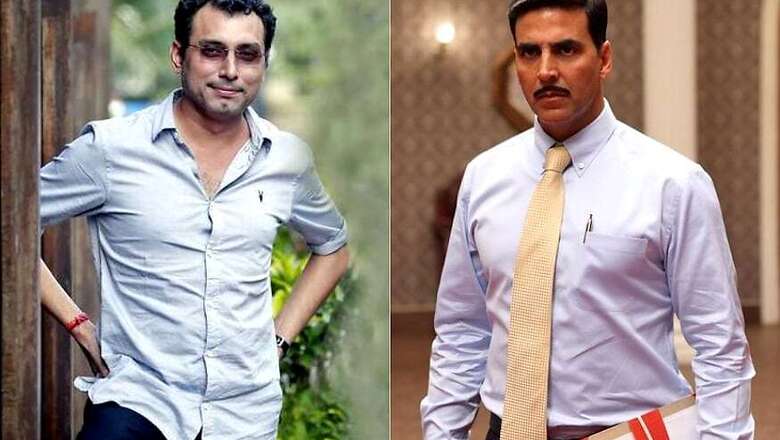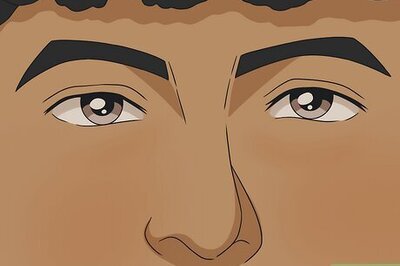Neeraj Pandey on Making Patriotic Films in Current Times and Revitalising Akshay Kumar's Film Career

views
Any list of the best modern Hindi thrillers would be incomplete without A Wednesday, Special 26, Baby and Naam Shabana, which redefined the thriller genre for modern audiences and cemented Neeraj Pandey as one of the most intellectually curious and talented filmmakers in Bollywood.
Yet among the thriller elements, there's a human drama at the core in all his films. They are not the typical good-versus-evil movies, but about people desperately doing what they think is right to survive. "I personally feel that it all starts from a character having a certain motivation something that he or she believes in. That's that person's conviction and that's what these stories are all about," Pandey notes.
One of the highlights in Pandey's 12-year old career was his collaboration with actor Akshay Kumar, which is most frequently cited example of an actor and director who have repeatedly brought out the best in each other. From Special 26 to Toilet: Ek Prem Katha, which Pandey co-produced, the duo has given multiple hits.
In fact, Pandey proved to be a turning point in Kumar's career which badly needed a reinvention at the time. Through his films, Kumar's brand of patriotism became what it is today. "Nobody was doing anything new with him at that time, so we thought it'd be a good casting if we roped in him," Pandey recalls.
After helming a series of successful and critically-acclaimed movies, the filmmaker is now set to make a debut in the digital world with a Hotstar original, Special Ops, which promises an intriguing look at the world of espionage. The show, starring Vinay Pathak, Kay Kay Menon and Divya Dutta, chronicles terror attacks the country has faced around a fictitious story.
During this interview, Pandey discussed how Special Ops came about and all the challenges that went with it, making patriotic films in current times, and helping Kumar reshape his career.
Edited excerpts from the interview:
In terms of sets and the magnitude of the show, Special Ops seems to be your most ambitious project yet. What would you say is the key to getting a project such as this right?
It falls upon the story completely. If you've thought about a narrative which is like seven or eight hours long, how do you sustain that particular story and keep your audience engaged for that longer duration? It's very different from a two-and-a-half hour narrative. So, we opened our digital company, i.e Friday Storytellers, because we wanted something big and grand to be our first content piece. Special Ops fitted the bill because it was very exciting for all of us and also the whole team was sort of keen on this story.
All your projects, including this one, have patriotic elements. How tricky is it to depict patriotism without demonising the other side and how conscious are you about depicting minority in your films in the current times?
I don't like to be jingoistic about the facts and that's how I expect my world to be. Essentially, that's the way I feel and that's the way the characters are depicted. No one claims to be patriotic in my films. They do what is expected of them and that's how they shape up and that's their motivation. The motivations don't need to be pronounced all the time and that's what I feel and that's the way it is.
You have a fascination for ensemble cast...
Yeah, I'm obsessed with it. Because I think when you make large pieces which have got different kinds of characters then why not pick up a great ensemble to tell that story? And, all our films have had a very proud ensemble cast. Even if it's a one scene or two scenes, actors have come and been a part of it.
Is it easy for you to keep the entire cast happy?
None of the actors are happy. It's very tough to keep everyone happy. But the trick to that is you don't care. You don't care too much after the fact that you've tried to give your best to them and most of them understand that, so they don't crib to me. Also, we've never really shortchanged them. Whenever we speak to anybody about a particular role, we always clearly mention about how long the role is going to be in the movie and that it could be a one minute role or a two-scenes part. And I always say, 'It's not like that today if you'll say no to me then I'll feel bad and won't call you the next day.' So we place our confidence in them, and at the same time, we have a very clear understanding of what one is getting into. And, that's the reason maybe Vinay (Pathak) today will be more than happy to come and do a couple of scenes on a project because he knows that he won't be shortchanged on that and whatever is being promised to him will be delivered.
You have had a lot of contribution in revitalising Akshay Kumar's film career...
I feel it doesn't work that way. These people are there because of the hard work that they have put in and also the certain belief that we shared in each other. Turning point happens because of a project or something but it's not to take seriously. Because the quality of hard work is there in Taapsee (Pannu) and the qualities of discipline and hard work are with Akshay. So, it would have come around sooner or later. I wanted them to tell my stories, so it was a great coincidence that worked both ways.
On the one hand, you have worked with great actors like Vinay Pathak, Kay Kay Menon, Naseeruddin Shah, among others. On the other hand, you've directed Akshay Kumar who, apart from being an actor, is also a huge star. What difference as a creator do you feel while working with them?
When we worked with Akshay, it was not Akshay 'the star' who would turn up on our sets. It was always Akshay Kumar, the actor-- no baggage, no frills. He always listens to you. There was never this star thing with him. Shital (Bhatia) and I started our careers with Naseeruddin Shah, Anupam Kher, Jimmy Shergill, Aamir Bashir, among others. These were all actors. And, then we kept on working with new people whether it was Taapsee or Sushant Singh Rajput who was relatively a newcomer at the time for a big film as MS Dhoni. So, we don't look at things that way. At the end of the day, if you're hired to do a part in a film, you'll still be an actor. There's no star system that is invited on sets. It has to be the actor who turns up because the actor will deliver and move on.
How did you think of casting Akshay for Special 26 and Baby as he was only doing comic roles during that time?
Nobody was thinking of doing such stuff with him at the time. And, we felt that it would be a new and an exciting thing for him, as well as the audience to see him in that kind of portrayals, so we thought potentially it would be a great casting.
Did you ever think that this would become Akshay's current image or that he would become the patriotism personified on screen?
I hope I never think of it that way. Our job is very clearly defined that when we are working on a project, it is to execute that particular project and then move on. It's not about thinking what it's going to do to my life and career or his life and career. I believe that's not the right way to think. It would also be a strong impediment in the way of executing a good project. I think the best way to collaborate is just to give it your best to anything that comes your way and leave the rest to life.
This is your first time on digital platform. You're bringing a loyal audience to the show anyway because people love watching your films. So, is that more of a plus or less a pressure?
I think it's mutual respect. If the audiences are expecting something from our company then it's our responsibility to satisfy them by churning out better projects everytime we get into something. It actually goes both ways. I'd rather have someone waiting for us than not (wanting to watch us). It's a great place to be in. All that we have to do is just live up to the expectations.




















Comments
0 comment